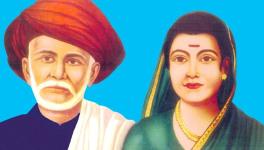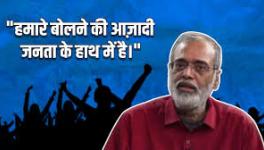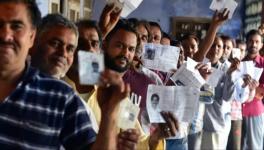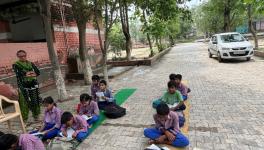“There is no political will to work towards gender justice”
In the backdrop of the contradictions between Justice Verma report and Union Government’s ordinance, Newsclick talks to documentary filmmaker Nakul Sawhney. His film Izzatnagri ki Asabhya Betiyaan (The immoral daughters in the land of honour) is a blazing exposure of the attitudes and acts of the khaps, and a display of resistance and repulse by young girls.
Q. While the Verma Committee recommendations were welcomed by women's and human rights groups, the ordinance promulgated by the Union government seems to have safely overlooked the most contentious of recommendations such as discarding protection to armed personnel, recognizing marital rape and also declaring the diktats of khap panchayats as illegal and irrelevant. The only issues the government considered were change in degrees of punishments to rapists and sexual offenders while overlooking the issues that have been in the debating circles for long. What is your take on it?
A. The Verma Committee recommendations looked at the issue of sexual harassment and rape in the larger context of women's empowerment and gender justice. Unfortunately, the ordinance is just the opposite. It only changes the degree of punishment and tries to equate gender justice with capital punishment. This is outrageous and clearly shows how non-serious the government is about ensuring justice. Again, not a word about AFSPA and to the extent that Chidambram now turns around and says that AFSPA can not be touched because the army doesn't agree. Are we ruled by the army or a democratically elected government? Clearly, there is no political will to work towards gender justice. Also, while the Verma Committee recommendations dedicated an entire chapter to the issue of khap panchayats and ‘honour killings’, which was widely welcomed, the government so far has not raised the issue of ‘honour killings’ or the need for a separate law. The government is pandering to the worst kind of caste politics. In fact, I don't even understand the need to pass an ordinance when there will be a Parliament Session very soon. This is just a desperate face-saving device of the government and they've ended up making a bigger fool of themselves.
Q. Don't you think even the Justice Verma Committee's Report, instead of making any substantial recommendation, has simply stated that it “expects the State to ensure that these institutions will not interfere with the choices made by men and women in respect of marriage?” Isn't that a weak approach to a serious issue?
A. The good thing about the report is that it doesn't only look at the immediate issue of sexual harassment and rape for which the committee was actually established. It looks at it far more comprehensively in terms of gender equality and women empowerment. There is an entire chapter which is dedicated to ‘honour killings’ and khap panchayats. So clearly the Justice Verma committee recommendations are a lot more than the government bargained for. It is a positive step in the sense that the committee has acknowledged the magnitude and gravity of the problem and created so much space for it in its recommendations but I feel it should have gone a step further.
It declares any assembly unlawful that gathers to oppose a matrimonial alliance which is recognied by the constitution. But at the same time, when that (the assembly or opposition) leads to a killing and that act of killing will be recognized under the CrPC as a regular killing, there is a problem in it. I'll give you two classic cases which were talked about extensively in Haryana. These two cases were highlighted the most around the time when the khap panchayats came into the limelight. One was the Manoj-Babli case and the other was the Ved Pal case. In both cases, the main instigators were not family members but community and khap leaders who actually tried to make a political mileage out of it. For example, Pawanjeet Bhanwaala in the Ved Pal case gave a diktat on camera that Ved Pal should be killed. He has been acquited in the Sessions Court. In the Manoj-Babli case, Ganga Ram was convicted in the Sessions Court but the High Court acquitted him. These are people whose role as instigators has clearly been established. So when it has been established, then there is no reason why they should be acquitted. And if they are being acquitted, it clearly proves how badly we need this law (a separate law for honour killing). On one hand, you can keep arresting the family members and people who are directly responsible for the killing but there are others who are far more responsible for the killing in an indirect manner. It is actually these self-appointed community leaders who are responsible for creating a climate in which these killings happen. That is why a separate law against ‘honour killings’ is necessary just as there was a separate law against Sati which went a long way in reducing the cases of Sati.
A separate legislation will also empower activists on the ground. There has been a demand by women's groups and human rights organizations for a separate law on ‘honour killings’ and ‘honour crimes’. In that sense, the committee doesn't seem to push forward for that law. Instead, what it does is that it quotes the Law Commission and the Law Commission's recommendations don't include ‘honour’ killings. ‘Honour killings’ are actually the most violent manifestation of this crime. So it makes no sense to not include killings in the separate law. It also does not look into judicial reforms or the need of speedier justice.
Q. The Report also noted that the Supreme Court in the Bhagwandas vs State (NCT of Delhi) had opined that ‘honour killing’ for whatever reason would come within the category of rarest of rare cases deserving death penalty. However, the Law Commission is wary of blanket direction given by the SC making death penalty a rule in ‘honour killings’. Has the Report failed to suggest an appropriate punishment for ‘honour killings’?
A. What is commendable about the Justice Verma Committe recommendations is that it hasn't surrendered to populist demands of capital punishment or chemical castrations. In the case of rape, for example, one of the biggest fears of women's groups is that if today you introduce death penalty then the rapist, or rapists as the case may be, will also try and kill the victim to wipe out any evidence. Personally, I am opposed to death penalty for several reasons. Now, whether ‘honour killings’ should be seen as the rarest of rare crimes and whether the rarest of rare crimes deserve capital punishment are two separate debates. Should ‘honour killings’ be seen as the rarest of rare crimes? Yes. Should the rarest of rare crimes translate into capital punishment? No. Can there be a more stringent punishment than life imprisonment? Yes.
Sometimes the self-appointed community leaders function with a great degree of efficiency where they are able to involve the village, unwillingly at times. It is possible because a lot of people in the villages are economically dependent on these Chowdharies for their survival. There was a case in the Hisar district of Haryana where the sarpanch of the village was a Dalit. A lot of the Dalit sarpanchs can operate only with the support of some Jat/ other dominant castes faction in the village. Now, the Dalit sarpanch's daughter had eloped with a Jat boy and they were caught. He was made to strangle his daughter on the village chowpal by the Chowdharies of the village and everybody was made to watch. Of course, he was being forced to do it but he couldn't do it so finally her uncles had to do it. In a case like this, a lot of villagers become unwilling accomplices. Even in the Ved Pal case, it is believed that some 200 people lynched him in the village and many others were witness to what was happening. Unfortunately, the police and state machinery are somewhere subservient to these Chowdharies. The leading political parties in Haryana have shamelessly stood up for the khap panchayats. Capital punishment is anyway not a deterrent. It is the efficiency with which the law-enforcing agencies function which will act as a deterrent.
Q. Do you think a lack of faith in juidiciary has led to the khaps gaining strongholds in rural societies? Will omission of serious judicial reforms from the Verma recommendations strengthen the khaps further?
A. People also sometimes go to khap panchayats because there is a speedy trial involved. That of course, is not the only reason why khap panchayats are flourishing. There are several reasons which are in a big way linked to caste revivalism in Haryana. At the same time, there is some degree of disillusionment with the judicial process because of which these extra-constitutional justice-delievering bodies are strengthened. So when you are acknowledging that, then clearly judicial reforms should have been part of the recommendations as well.
Q. Khaps Panchayats are ill-famed for issuing diktats, and for initiating and approving 'honour killings.' The Committee has expressed that the khaps have been exercising disproportionate degrees of control in the name of tradition. Earlier, the legality of these institutions was questioned by the Supreme Court and others. However, no legislation has been introduced to ban the illegal measures of these institutions. Do you think the state governments would take any initiative when they fear political fallout?
A. In a big way, yes. But we need to understand something else too. Someone like Naveen Jindal is not a grassroots politician. He is somebody who had lots of money; he is an industrialist. He pumped in that money into winning the election. Also, Chautala just inherited his father's legacy. They have not risen from the grassroots and that is why their understanding is fairly flawed. And that is why they depend on these Chowdharies for their vote bank.
The fact is that even the youngsters who are eloping are aware of the possible consequences if they are caught. Yet those marriages continue, and the 'transgression' of traditions and boundaries continue. What does it show? It shows that there is a sort of rejection for these so-called community courts enforced by the khap panchayats. Naveen Jindal, in his defense for representing the khap panchayats, says that these (khaps) are people in his constituency and he is duty-bound to represent them in the Parliament. But there are as many people who are opposed to them, why isn’t he representing them? Is it because they don't have a powerful voice? Isn't it his duty as an MP to identify these people and give them that confidence to be able to speak openly and to let them know that he stands by them and represent their voice in the Parliament as well? Clearly, the marginalized and the oprresed are being sidelined and he doesn't even want to hear those voices. Naveen Jindal or even Chautala don't understand the political climate in the real sense on the ground. I think they will have to pay a heavy price for taking the positions that have taken today.
Q. The Report has talked about police reforms in detail. Since the police personnel are controlled by the local politicians, who are well-connected to the khap, do you think they would help to tackle the glaring issue of ‘honour killing’? Or do you see a need to constitute a special cell to look into young couples in inter-caste, or intra-gotra, or inter-religious relationships and marriages?
A. ‘Honour killings’ cannot be seen in isolation. They have to be understood in the larger context of caste heirarchies, gender discrimination and communalism. Effective legislation plays a significant role in preventing cases of ‘honour crimes’. For example, after a PIL was filed by sections of civil society, the Haryana government was directed by the court to open couple-protection homes/shelters. Because of some incredible work done by women's organizations in Haryana, particularly by AIDWA, now there is a growing pressure on the police to act responsibly when eloped couples come for protection. When you are eloping, you are at the mercy of the police and the police are not free of these caste biases or patriarchal thinking. But today once you register yourself in a couple-protection home, your security becomes the responsibilty of the SPO or the police officer in the protection home. So that cop cannot absolve himself from his obligation to protect you now.
It has actually made a lot of difference. Because of which many young couples have found protection in these couple-protection homes. Police reforms are required in a big way. Effective implemenation and pressure by human rights organizations and women's groups too play a big role. Although this is not to assume that the mindsets of the police would have changed. What has changed is that now there is accountability. We can talk about a special cell, but who will constitute that cell? It cannot be something arbitrary. At some stage, the police will be involved. You and I are not equipped to protect them (eloped couples). Even if there is a special cell, the important thing is to know how to work on and with the police.
Q. Khaps from Haryana have responded to the report and do not feel the need to approach the committee regarding the issue. They say that they don’t have high hopes from the report because the reports are to enforce the whims and fancies of the government. They also went on to say that they had always made statements that rape convicts should not be given capital punishment but now that the Verma commission report says so, everybody will accept the suggestion. What is your take on that?
A. Khaps are not opposing capital punishment from the human rights perspective. They go around killing people. It's not that they have any love for human life. They are actually opposing it from the point of view of actually protecting some of these rapists. In Harayana, there have been some 48 reported cases of rape in the two months. And a lot of these rapes have been committed by upper caste men and the victims have been Dalit girls. Clearly that is why the khaps have never taken a strong stand against rape. The rapists are often men from influential famillies; from the dominant caste.
In my film Izzatnagri..., I asked the khaps that if they give diktats for what they claim are errant couples, then would they do the same in cases of rape. There is a point blank no. So I asked them what they usually do in cases of rape. They said Ussko hum chaar joote maarte hai bhari samaj ke saamne (We beat him in full public view). What sort of joke is this? Clearly, rape is not a big crime for them.
Rape is not so much a sexual act but an act of aggression and a means of establishing domination over the victim. And establishing domination is pretty much what these khaps are doing. Let us also understand the khap’s call for lowering the marriage age for girls to 15 years to avoid rape. What it means is that the girl does not get a chance at completing her education, having an economically independent life, and making independent decisions. Essentially what the khaps are saying is that it is the independent girls who are getting raped. It's a warning that says 'if you transgress, expect rape.' It is actually a means of stopping any chances of self-development for the girl by getting her married at 15.
Disclaimer: The views expressed here are the interviewee's personal views, and do not necessarily represent the views of Newsclick
Get the latest reports & analysis with people's perspective on Protests, movements & deep analytical videos, discussions of the current affairs in your Telegram app. Subscribe to NewsClick's Telegram channel & get Real-Time updates on stories, as they get published on our website.

























